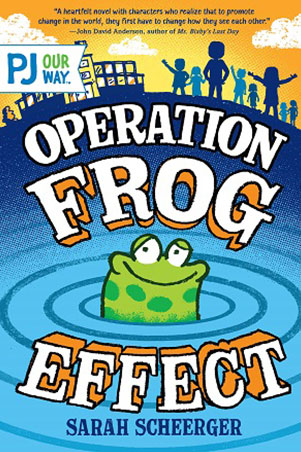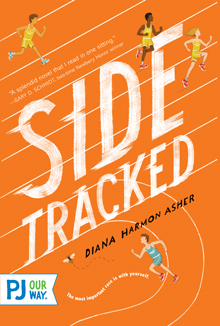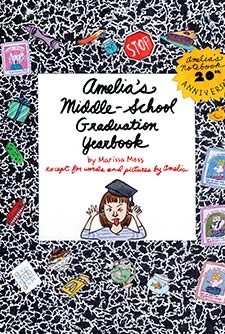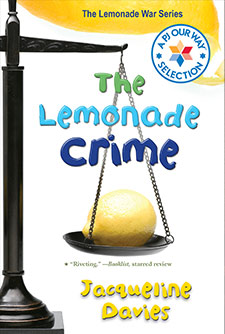Operation Frog Effect
Average Rating
What the Book is About
For Aviva, Kai, Emily, Henry, Blake, Kayla, Sharon, and Cecilia, fifth grade means a wonderful teacher and a class pet frog. It also means changing friendships and being put at a table with kids they don’t like. When a social action project goes badly wrong and their beloved Ms. Graham is suspended, the kids must put aside their differences and work together to save her job. Told in eight voices through journal entries, letters, verse, film scripts, and comics, this is an engaging read with important messages about bullying, immigration, and poverty.
Jewish Content & Values
- Aviva’s parents are Israeli, and she calls them Ima and Abba.
- The family celebrates Hanukkah with latkes; gelt; and a dreidel, and they have Shabbat dinner, including candle-lighting and challah. It is mentioned that the family does not eat bacon because they’re Jewish.
- Aviva realizes that a class experiment that separates kids into whistlers (who receive preferential treatment) and non-whistlers (who sit at the back of the class) is related to their study of the diary of Anne Frank and segregation in the United States.
- The children’s well-meaning attempt at social action (tikkun olam, repairing the world) goes wrong, and their teacher ends up getting suspended because of it. The kids do teshuva (repentance), working together to right the wrong that occurred as a result of their actions.
Positive Role Models
- Ms. Graham tells the children that it is important to be kind, and that “you get to choose what kind of person you want to be.” She inspires the children to “speak up when we see injustice” and tells them that honesty is not an excuse for being mean.
- Aviva inadvertently cheats in a relay race that her team wins, and she admits her error to the teacher even though Ms. Graham hadn’t noticed. Aviva is the only one to speak up and tell Ms. Graham that the discrimination against non-whistlers is wrong. After bowing to the will of bossy Kayla and excluding their best friend Emily, Aviva eventually finds the courage to stand up to Kayla and rekindles her friendship with Emily.
- Aviva, Emily, Sharon, Kai, Blake, Kayla, and Henry put their differences aside and work together to get justice for Ms. Graham.
Content Advisory
Talk it Over!
More for You
What the Book is About
For Aviva, Kai, Emily, Henry, Blake, Kayla, Sharon, and Cecilia, fifth grade means a wonderful teacher and a class pet frog. It also means changing friendships and being put at a table with kids they don’t like. When a social action project goes badly wrong and their beloved Ms. Graham is suspended, the kids must put aside their differences and work together to save her job. Told in eight voices through journal entries, letters, verse, film scripts, and comics, this is an engaging read with important messages about bullying, immigration, and poverty.
Jewish Content & Values
- Aviva’s parents are Israeli, and she calls them Ima and Abba.
- The family celebrates Hanukkah with latkes; gelt; and a dreidel, and they have Shabbat dinner, including candle-lighting and challah. It is mentioned that the family does not eat bacon because they’re Jewish.
- Aviva realizes that a class experiment that separates kids into whistlers (who receive preferential treatment) and non-whistlers (who sit at the back of the class) is related to their study of the diary of Anne Frank and segregation in the United States.
- The children’s well-meaning attempt at social action (tikkun olam, repairing the world) goes wrong, and their teacher ends up getting suspended because of it. The kids do teshuva (repentance), working together to right the wrong that occurred as a result of their actions.
Positive Role Models
- Ms. Graham tells the children that it is important to be kind, and that “you get to choose what kind of person you want to be.” She inspires the children to “speak up when we see injustice” and tells them that honesty is not an excuse for being mean.
- Aviva inadvertently cheats in a relay race that her team wins, and she admits her error to the teacher even though Ms. Graham hadn’t noticed. Aviva is the only one to speak up and tell Ms. Graham that the discrimination against non-whistlers is wrong. After bowing to the will of bossy Kayla and excluding their best friend Emily, Aviva eventually finds the courage to stand up to Kayla and rekindles her friendship with Emily.
- Aviva, Emily, Sharon, Kai, Blake, Kayla, and Henry put their differences aside and work together to get justice for Ms. Graham.





